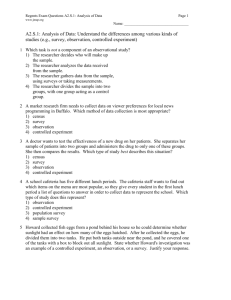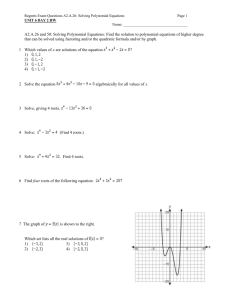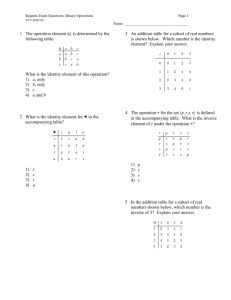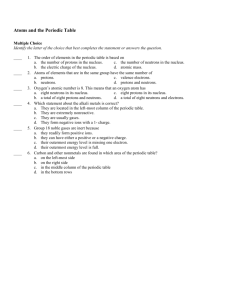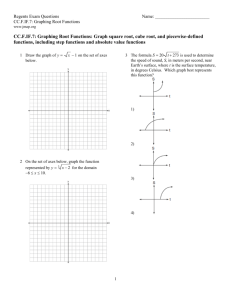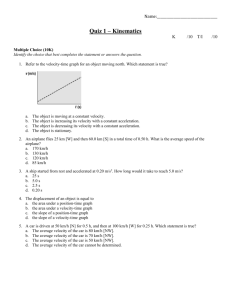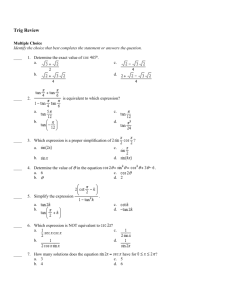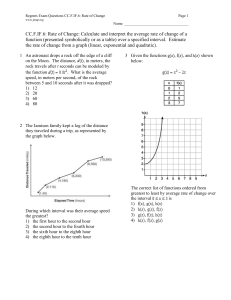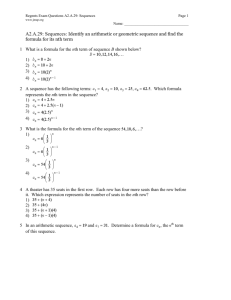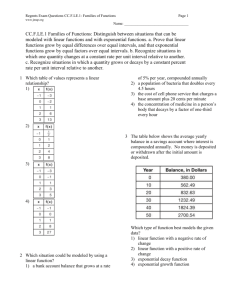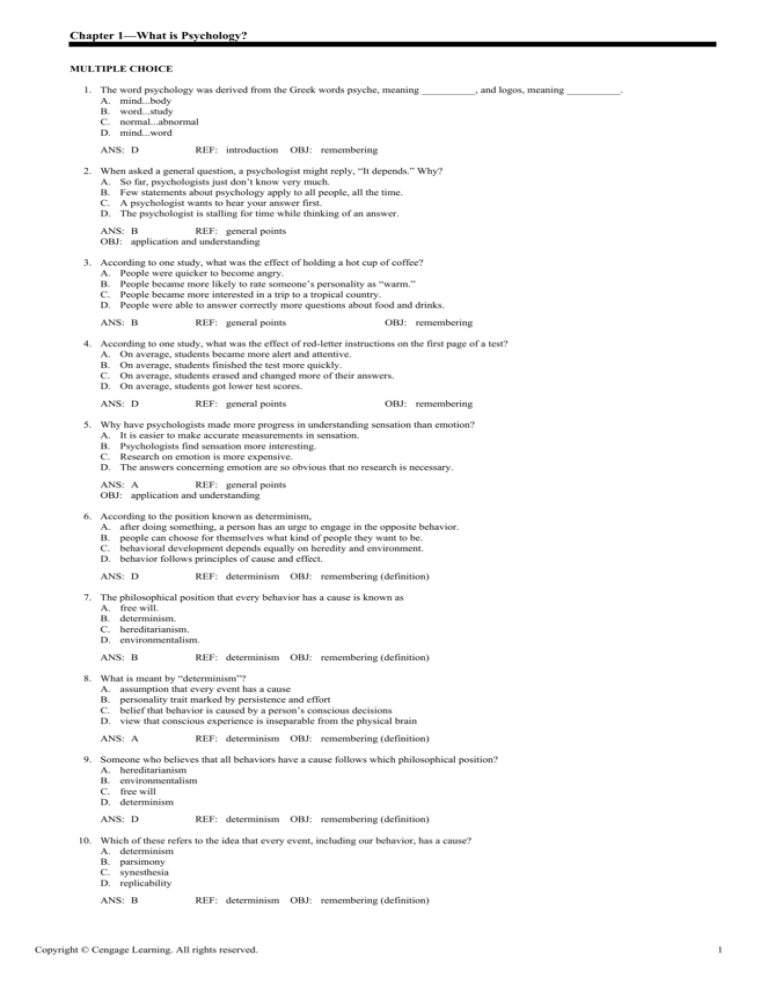
Chapter 1—What is Psychology?
MULTIPLE CHOICE
1. The word psychology was derived from the Greek words psyche, meaning __________, and logos, meaning __________.
A. mind...body
B. word...study
C. normal...abnormal
D. mind...word
ANS: D
REF: introduction
OBJ: remembering
2. When asked a general question, a psychologist might reply, “It depends.” Why?
A. So far, psychologists just don’t know very much.
B. Few statements about psychology apply to all people, all the time.
C. A psychologist wants to hear your answer first.
D. The psychologist is stalling for time while thinking of an answer.
ANS: B
REF: general points
OBJ: application and understanding
3. According to one study, what was the effect of holding a hot cup of coffee?
A. People were quicker to become angry.
B. People became more likely to rate someone’s personality as “warm.”
C. People became more interested in a trip to a tropical country.
D. People were able to answer correctly more questions about food and drinks.
ANS: B
REF: general points
OBJ: remembering
4. According to one study, what was the effect of red-letter instructions on the first page of a test?
A. On average, students became more alert and attentive.
B. On average, students finished the test more quickly.
C. On average, students erased and changed more of their answers.
D. On average, students got lower test scores.
ANS: D
REF: general points
OBJ: remembering
5. Why have psychologists made more progress in understanding sensation than emotion?
A. It is easier to make accurate measurements in sensation.
B. Psychologists find sensation more interesting.
C. Research on emotion is more expensive.
D. The answers concerning emotion are so obvious that no research is necessary.
ANS: A
REF: general points
OBJ: application and understanding
6. According to the position known as determinism,
A. after doing something, a person has an urge to engage in the opposite behavior.
B. people can choose for themselves what kind of people they want to be.
C. behavioral development depends equally on heredity and environment.
D. behavior follows principles of cause and effect.
ANS: D
REF: determinism
OBJ: remembering (definition)
7. The philosophical position that every behavior has a cause is known as
A. free will.
B. determinism.
C. hereditarianism.
D. environmentalism.
ANS: B
REF: determinism
OBJ: remembering (definition)
8. What is meant by “determinism”?
A. assumption that every event has a cause
B. personality trait marked by persistence and effort
C. belief that behavior is caused by a person’s conscious decisions
D. view that conscious experience is inseparable from the physical brain
ANS: A
REF: determinism
OBJ: remembering (definition)
9. Someone who believes that all behaviors have a cause follows which philosophical position?
A. hereditarianism
B. environmentalism
C. free will
D. determinism
ANS: D
REF: determinism
OBJ: remembering (definition)
10. Which of these refers to the idea that every event, including our behavior, has a cause?
A. determinism
B. parsimony
C. synesthesia
D. replicability
ANS: B
REF: determinism
Copyright © Cengage Learning. All rights reserved.
OBJ: remembering (definition)
1
11. People who support the concept of free will believe that
A. heredity plays a critical role in the development of behavior.
B. some choices go beyond the realm that science could study or predict.
C. different parts of the brain control different types of behavior.
D. behavior is basically predictable.
ANS: B
REF: determinism
OBJ: remembering (definition)
12. People who support the idea of free will OPPOSE the concept that
A. the mind and brain are separate entities.
B. people can sometimes change their opinions.
C. all behaviors have causes that scientists can study.
D. people have a conscious mind.
ANS: C
REF: determinism
OBJ: application and understanding
13. Someone who supports the position of determinism (as opposed to free will) believes that
A. people can change their own behavior if they try hard enough.
B. the development of behavior depends more on the environment than on genetics.
C. every behavior has a cause.
D. the only way to find out why people act as they do is simply to ask them.
ANS: C
REF: determinism
OBJ: application and understanding
14. Adherents of free will disagree with adherents of determinism with regard to whether behavior is
A. useful
B. inherited.
C. persistent.
D. predictable.
ANS: D
REF: determinism
OBJ: application and understanding
15. A psychologist who attempts to test the assumptions of determinism is most likely to investigate
A. the role of heredity in the development of behavior.
B. whether it is possible to predict behaviors.
C. whether different parts of the brain have different functions in behavior.
D. why certain people work harder to achieve their goals than other people do.
ANS: B
REF: determinism
OBJ: application and understanding
16. Which of the following (if true) would most seriously contradict the assumptions of determinism?
A. Some behaviors are controlled mostly by heredity and others mostly by environment.
B. Two parts of the brain control the same aspects of behavior.
C. Some people with high motivation to succeed nevertheless fail.
D. Certain behaviors are completely unpredictable.
ANS: D
REF: determinism
OBJ: application and understanding
17. A psychologist offers people three pairs of shoes and investigates whether their choices are predictable. The results ar e likely to be relevant to
which of these issues?
A. free will versus determinism
B. the mind-brain problem
C. the nature-nurture issue
D. the ethics of behavior modification
ANS: A
REF: determinism
OBJ: application and understanding
18. According to adherents of determinism, why is it hard to predict people's behavior accurately?
A. People have a free will.
B. Some behaviors have causes but others do not.
C. Some behaviors have many complex causes.
D. The experimental method is appropriate only for the physical sciences.
ANS: C
REF: determinism
OBJ: application and understanding
19. The mind-brain (or mind-body) problem refers to the question:
A. Which is more important in controlling behavior, the mind or the brain?
B. How is the mind related to the brain and does one control the other?
C. What causes the mind to undergo "out-of-body" experiences?
D. Which part of the mind controls the body?
ANS: B
REF: mind-brain
OBJ: remembering
20. What do psychologists and philosophers mean by the term mind-body question?
A. "How does brain activity relate to mental activity?"
B. "Which is stronger, the mind or the body?"
C. "Is the mind aware of anything that goes on in the body?"
D. "Do you mind what I do with your body?"
ANS: A
REF: mind-brain
OBJ: remembering
21. The term “monism” refers to which belief?
A. People have the free will to decide their own destiny.
B. Children’s relationship with their parents influences their later social behavior.
C. People in cultures throughout the world have certain similarities in their behavior.
D. Brain activity and mental activity are the same thing.
ANS: D
REF: mind-brain
Copyright © Cengage Learning. All rights reserved.
OBJ: remembering (definition)
2
22. "In a universe composed of matter and energy, why is there such a thing as consciousness?" This question relates most closely to the
philosophical issue of
A. nature and nurture
B. free will and determinism
C. ethics and consequences
D. mind and brain
ANS: D
REF: mind-brain
OBJ: application and understanding
23. Which of these research questions is most closely related to the mind-brain problem?
A. Why do the people in some countries drink more alcohol than others?
B. Why do boys and girls play with different kinds of toys?
C. Are different areas of the brain more or less active during different behaviors?
D. Are certain kinds of behavior unpredictable or random?
ANS: C
REF: mind-brain
OBJ: application and understanding
24. Dualism--the idea that mind and brain exist separately--conflicts with which of these?
A. psychologists’ principle of cognitive dissonance
B. economists’ principle of supply and demand
C. biologists’ principle of differential reproduction
D. physicists’ principle of conservation of matter and energy
ANS: D
REF: mind-brain
OBJ: application and understanding
25. Brain researchers would probably be most comfortable with which of the following statements?
A. The mind controls thought and the brain controls behavior.
B. Mental activity causes brain activity.
C. Brain activity and mental activity are completely independent.
D. Brain activity and mental activity are the same thing.
ANS: D
REF: mind-brain
OBJ: application and understanding
26. The nature-nurture issue can best be defined as the study of
A. how brain activity causes mental activity.
B. whether or not behavior is predictable or random.
C. how differences in behavior relate to differences in heredity and environment
D. how the mind directs free will.
ANS: C
REF: nature-nurture
OBJ: remembering (definition)
27. The nature-nurture issue is the question of how the development of behavior depends on
A. heredity and environment.
B. the external situation and an internal will.
C. the physical environment and the social environment.
D. health and nutrition.
ANS: A
REF: nature-nurture
OBJ: remembering
28. The nature-nurture issue concerns the relationship between
A. mind and brain.
B. heredity and environment.
C. free will and determinism.
D. conscious and unconscious.
ANS: B
REF: nature-nurture
OBJ: remembering
29. Which of the following research questions is most directly related to the nature-nurture issue?
A. Are some areas of the brain more active than others during a given behavior?
B. Are certain behaviors completely random or unpredictable?
C. Are behavioral differences between boys and girls due to differences in their genes?
D. Is personality consistent from one situation to another?
ANS: C
REF: nature-nurture
OBJ: application and understanding
30. If you become skillful at basketball because your friends encourage you to play and you have practiced a lot, your behavior is influenced
primarily by __________. If you are good at basketball mainly because you are very tall, as have been all of the members of your family for
generations, your behavior is influenced primarily by __________.
A. nature...nurture
B. nurture...nature
C. nature...nature
D. nurture...nurture
ANS: B
REF: nature-nurture
OBJ: application and understanding
31. A psychotherapist with an M.D. degree is a ______. One with a Ph.D. is a _________
A. psychiatrist... clinical psychologist
B. clinical psychologist... psychoanalyst
C. psychoanalyst... psychiatrist
D. clinical psychologist... psychiatrist
ANS: A
REF: providers to individuals
Copyright © Cengage Learning. All rights reserved.
OBJ: remembering
3
32. What education does a clinical psychologist have?
A. Ph.D. or Psy. D.
B. M.D.
C. M.D. plus special training in psychoanalysis
D. bachelor’s degree only
ANS: A
REF: providers to individuals
OBJ: remembering
33. What education does a psychiatrist have?
A. Ph.D. or Psy.D.
B. M.D.
C. M.D. plus special training in psychoanalysis
D. bachelor’s degree only
ANS: B
REF: providers to individuals
OBJ: remembering
34. A psychotherapist with a medical degree is a _____ and one with a Ph.D. is a _____.
A. psychologist... psychoanalyst
B. psychoanalyst... psychologist
C. psychologist... psychiatrist
D. psychiatrist... psychologist
ANS: D
REF: providers to individuals
OBJ: remembering
35. What distinguishes a psychoanalyst from other kinds of therapists?
A. strong interest in brain research
B. strong adherence to theories pioneered by Sigmund Freud
C. strong reliance on antidepressants and similar medications
D. use of a combination of treatment methods
ANS: B
REF: providers to individuals
OBJ: remembering
36. What can a psychiatrist do that a clinical psychologist cannot do, in most states?
A. prescribe drugs.
B. conduct research.
C. analyze dreams.
D. hypnotize people.
ANS: A
REF: providers to individuals
OBJ: application and understanding
37. What educational degree does a psychiatrist hold?
A. M.S.
B. M.D.
C. Ph.D.
D. B.A.
ANS: B
REF: providers to individuals
OBJ: remembering
38. Can psychoanalysts prescribe drugs?
A. Yes, all of them can.
B. No, none of them can.
C. Only those who are psychiatrists can.
D. Only those who are clinical psychologists can.
ANS: C
REF: providers to individuals
OBJ: remembering
39. Which of the following does NOT typically offer help to troubled people?
A. clinical psychologist
B. clinical social worker
C. counseling psychologist
D. social psychologist
ANS: D
REF: providers to individuals
OBJ: remembering
40. What kind of specialist provides advice and consultation to police, lawyers, and courts?
A. Forensic psychologists
B. Counseling psychologists
C. Developmental psychologists
D. Psychiatrist
ANS: A
REF: providers to individuals
OBJ: remembering (definition)
41. Industrial/Organizational psychologists observe and study
A. how people influence one another.
B. people at work.
C. individual problems.
D. educational problems.
ANS: B
REF: industrial/organizational
Copyright © Cengage Learning. All rights reserved.
OBJ: remembering
4
42. Dr. Domuch, who helps a company train people for jobs, select good employees, and organize the workplace, is a/an __________
psychologist.
A. clinical
B. industrial/organizational
C. cognitive
D. developmental
ANS: B
REF: industrial/organizational
OBJ: application and understanding
43. Which of these is NOT a typical activity for industrial-organizational psychologists?
A. designing or redesigning jobs
B. advising employers on how to select among jobs
C. recommending incentives to improve work motivation
D. counseling employees who have emotional disorders
ANS: D
REF: industrial/organizational
OBJ: application and understanding
44. What kind of psychologist helps a corporation choose the right people to hire?
A. counseling
B. forensic
C. social
D. industrial/organizational
ANS: D
REF: industrial/organizational
OBJ: application and understanding
45. What kind of psychologist helps a company increase workers’ productivity and satisfaction?
A. forensic psychologist
B. clinical psychologist
C. personality psychologist
D. industrial/organizational psychologist
ANS: D
REF: industrial/organizational
OBJ: remembering
46. What is one of the main activities of an industrial/organizational psychologist?
A. represent the interests of employees when they are in conflict with management.
B. provide counseling for workers who are distressed about their job.
C. advise a company's personnel office on how to select among job applicants.
D. provide therapy for those individuals who experience "job burnout".
ANS: C
REF: industrial/organizational
OBJ: remembering
47. The primary concern in the field of human factors (ergonomics) is to
A. understand the attitudes of people at work.
B. improve the design of machines so that people can use them more effectively.
C. choose the people who can most effectively learn how to operate machines.
D. redesign jobs so that more work can be done automatically and by fewer employees.
ANS: B
REF: human factors
OBJ: remembering
48. The field of ergonomics is also known as:
A. industrial-organizational psychology.
B. school psychology.
C. human factors.
D. artificial intelligence.
ANS: C
REF: human factors
OBJ: remembering (definition)
49. What is an important concentration for the field of human factors (ergonomics)?
A. helping to design equipment so that people can use it easily.
B. measuring people's muscle activity during various tasks.
C. understanding the relationship between workers' performance and the pay scale.
D. counseling workers whose personal problems interfere with job performance.
ANS: A
REF: human factors
OBJ: remembering
50. Which of these is a key concern for the field known as ergonomics or human factors?
A. facilitating cooperation between groups of people with a history of hostility.
B. understanding the evolution of the human mind.
C. design of machinery and instructions so people can understand them better.
D. improving education for children who learn slowly or differently from others.
ANS: C
REF: human factors
OBJ: remembering
51. Which type of psychologist is most interested in helping people use machines?
A. psychometrician
B. environmental psychologist
C. forensic psychologist
D. human factors
ANS: D
REF: human factors
Copyright © Cengage Learning. All rights reserved.
OBJ: remembering
5
52. Human factors specialists and Industrial psychologists usually provide their services to
A. children and adolescents.
B. companies.
C. other psychologists.
D. adults.
ANS: B
REF: human factors
OBJ: remembering
53. What education must someone have to practice school psychology in the U.S.?
A. bachelor's degree.
B. master's degree or doctoral degree.
C. community college degree.
D. high school diploma and a recommendation from a school counselor.
ANS: B
REF: school psych
OBJ: remembering
54. A specialist in the psychological condition of students is known as a(n)
A. human factors specialist
B. school psychologist.
C. forensic psychologist.
D. counseling social worker.
ANS: B
REF: school psych
OBJ: remembering
55. Which of the following jobs is a school psychologist most likely to perform?
A. consult with teachers about how to meet the educational needs of a troubled student
B. prescribe and administer medications for students who need them
C. advise a parole board about which students are most likely to be dangerous
D. conduct study sessions for students who need help with their homework
ANS: A
REF: school psych
OBJ: application and understanding
56. Teachers seeking help in coping with students with special needs would consult which of these?
A. psychiatrist.
B. social worker.
C. ergonomist.
D. school psychologist.
ANS: D
REF: school psych
OBJ: application and understanding
57. Which of the these does NOT typically provide services to an organization?
A. industrial-organizational psychologist
B. school psychologist
C. human factors specialist
D. cognitive psychologist
ANS: D
REF: school psych
OBJ: remembering
58. Toddlers eat anything that tastes good, but older children refuse many foods. Which type of psychologist is most likely to study this change
over age?
A. biological psychologists
B. psychoanalysts
C. developmental psychologists
D. cognitive psychologists
ANS: C
REF: developmental
OBJ: application and understanding
59. Psychologists specializing in learning and motivation stress which point about food choice?
A. Children quickly learn to prefer brightly colored foods.
B. Food choice depends on learning how many calories per bite each food contains.
C. We are most adept at learning to avoid foods which cause illness.
D. Humans learn what foods to eat much more successfully than other species do.
ANS: C
REF: learning and motivation
OBJ: application and understanding
60. Cognition can best be defined as
A. emotional attachment.
B. intense concentration.
C. how we think and acquire knowledge.
D. transmission between neurons.
ANS: C
REF: cognitive
OBJ: remembering (definition)
61. A cognitive psychologist studying differences among individuals concentrates on their
A. knowledge and thinking.
B. social influences.
C. emotions.
D. age
ANS: A
REF: cognitive
Copyright © Cengage Learning. All rights reserved.
OBJ: remembering (definition)
6
62. A cognitive psychologist studies
A. the relationship between brain and behavior.
B. the influence of the social environment on behavior.
C. the behavior of infants.
D. thinking and acquiring knowledge.
ANS: D
REF: cognitive
OBJ: remembering (definition)
63. Which type of psychologist specializes in the study of thought and knowledge?
A. quantitative psychologist
B. cognitive psychologist
C. behaviorist
D. physiological psychologist
ANS: B
REF: cognitive
OBJ: remembering (definition)
64. In which way would a cognitive psychologist be most likely to try to help a slow-learning child?
A. teach better problem-solving strategies
B. test the child's vision and hearing
C. administer drugs or prescribe a special diet to alter brain chemistry
D. measure the child's IQ
ANS: A
REF: cognitive
OBJ: application and understanding
65. Which of the following is known to influence people’s food preferences?
A. variations in their brain size
B. variations in the speed of conduction of their brain cells
C. variations in the size of their stomach
D. variations in their number of taste buds
ANS: D
REF: biological
OBJ: remembering
66. Which of these is generally true of people with a greater than average number of taste buds?
A. They dislike both bitter foods and foods that are too sweet.
B. They crave sweet tastes more than most people do.
C. They eat their meals more rapidly than most people do.
D. They eat their meals more slowly than most people do.
ANS: A
REF: biological
OBJ: remembering
67. Which of these sometimes causes a strong craving for salty tastes?
A. high levels of insulin.
B. low blood glucose.
C. damage to the corpus callosum.
D. damage to the adrenal glands.
ANS: D
REF: biological
OBJ: remembering
68. A biopsychologist tries to relate behavior to
A. interactions between conscious and unconscious thought processes.
B. experiences early in life.
C. electrical and chemical activities in the body.
D. the influences of other people.
ANS: C
REF: biological
OBJ: remembering
69. Which type of psychologist would be most interested in the genetic makeup of an individual?
A. cognitive
B. behaviorist
C. biological
D. psychoanalytic
ANS: C
REF: biological
OBJ: remembering
70. Which of the following is a biopsychologist LEAST likely to investigate?
A. effects of drugs on behavior
B. effects of brain damage on behavior
C. effects of genetics on behavior
D. effects of unconscious thoughts on behavior
ANS: D
REF: biological
OBJ: application and understanding
71. Which of these is most likely to study the effects of brain damage on behavior?
A. biopsychologist
B. psychoanalyst
C. cognitive psychologist
D. counseling psychologist
ANS: A
REF: biological
OBJ: remembering
72. What do people show when they are deficient in body salt?
A. an increased preference for salty tastes.
B. a decreased preference for salty tastes.
C. an increased preference for sweet tastes.
D. a decreased preference for sweet tastes.
ANS: A
REF: biological
Copyright © Cengage Learning. All rights reserved.
OBJ: remembering
7
73. Which of the following is most likely to lead to an increased preference for salty tastes?
A. prolonged experience with a low-fat diet
B. repeated nausea
C. damage to the adrenal glands
D. damage to the lateral hypothalamus
ANS: C
REF: biological
OBJ: remembering
74. Damage to which structure leads to an increased need for consuming salt?
A. ventromedial hypothalamus.
B. lateral hypothalamus.
C. thyroid gland.
D. adrenal gland.
ANS: D
REF: biological
OBJ: remembering
75. Damage to the adrenal gland can lead to an increased need for which dietary substance?
A. calcium
B. protein
C. salt
D. carbohydrates
ANS: C
REF: biological
OBJ: remembering
76. Why do many menstruating women crave potato chips?
A. Their body needs calories.
B. Their body needs fats.
C. Their body needs salt.
D. They need to chew something.
ANS: C
REF: biological
OBJ: application and understanding
77. Which type of psychologist tries to explain why a behavior may have been useful to our ancestors?
A. cognitive psychologist
B. social psychologist
C. human factors specialist
D. evolutionary psychologist
ANS: D
REF: evolutionary OBJ: remembering
78. “Men behave differently from women because of what helped our ancestors survive and reproduce.” Which type of psychologist makes this
type of statement?
A. cognitive
B. behaviorist
C. evolutionary
D. psychoanalytic
ANS: C
REF: evolutionary OBJ: application and understanding
79. An evolutionary psychologist is most likely to consider which of these questions?
A. Why are men more likely than women to seek multiple sexual partners?
B. How does a child’s understanding of numbers increase between ages 4 and 8?
C. What distinguishes an expert in some field from average people?
D. What is the difference between motivation and emotion?
ANS: A
REF: evolutionary OBJ: application and understanding
80. Which kind of psychologist is most concerned with how other people influence our behavior?
A. cognitive psychologist
B. evolutionary psychologist
C. quantitative psychologist
D. social psychologist
ANS: D
REF: social
OBJ: remembering
81. Which of these is the main interest of social psychologists?
A. how behavior develops as a function of age
B. how people influence one another’s behavior
C. the role of learning and memory in behavior
D. how human behavior has changed over the course of history
ANS: B
REF: social
OBJ: remembering
82. People who expect someone to succeed treat that person differently and thereby cause the success they expected. Which ty pe of psychologist
studies processes like this?
A. physiological psychologist
B. comparative psychologist
C. social psychologist
D. quantitative psychologist
ANS: C
REF: social
Copyright © Cengage Learning. All rights reserved.
OBJ: application and understanding
8
83. Do people learn the facial expression to use for various emotions, or are the expressions part of human nature: Which of these would
investigate that question?
A. human factors specialists
B. psychoanalysts
C. cross-cultural psychologists
D. counseling psychologists
ANS: C
REF: cross-cultural
OBJ: remembering
84. Which of the following correctly states how a particular type of psychologist would study behavioral differences between boys and girls?
A. A cognitive psychologist would investigate brain differences.
B. A psychoanalyst would measure the differences without trying to explain them.
C. A human factor specialist would compare boys’ and girls’ thought processes.
D. A social psychologist would study how adults’ expectations affect boys and girls.
ANS: D
REF: social
OBJ: application and understanding
85. In one study, what had the biggest effect on whether Japanese exchange students felt homesick?
A. foods
B. religion
C. dating customs
D. family life
ANS: A
REF: cross-cultural
OBJ: remembering
86. What employment opportunity is available for people with a bachelor’s degree in psychology?
A. They can set up an independent practice to provide psychotherapy.
B. They usually work as psychotherapists under someone's supervision.
C. Most get jobs doing psychological research.
D. Most take jobs not closely related to psychology.
ANS: D
REF: psych major
OBJ: remembering
87. How does psychology differ from other scientific fields?
A. Psychology does not use the experimental method.
B. Psychology does not seek to understand cause and effect.
C. Psychology began as a deliberate intention to start a new science.
D. Psychological research began in ancient Greece before the other sciences.
ANS: C
REF: early era
OBJ: application and understanding
88. Who established the first psychological research laboratory?
A. Sigmund Freud
B. William James
C. Wilhelm Wundt
D. John Watson
ANS: C
REF: Wundt
OBJ: remembering
89. When Wilhelm Wundt started his psychological research, which of these was a key issue?
A. What can psychologists do to prevent war?
B. What are the elements of experience?
C. Can we identify the genes responsible for mental retardation?
D. What is the meaning of dreams?
ANS: B
REF: Wundt
OBJ: remembering
90. Wilhelm Wundt is famous for
A. being the first person to receive a Ph.D. in psychology in the United States.
B. establishing the first mental-health clinic.
C. establishing the first laboratory for psychological research.
D. being the first patient successfully treated by a psychotherapist.
ANS: C
REF: Wundt
OBJ: remembering
91. The first psychological laboratory was set up by
A. Wilhelm Wundt in 1879.
B. Sigmund Freud in 1897.
C. William James in 1890.
D. Mary Calkins in 1895.
ANS: A
REF: Wundt
OBJ: remembering
92. Wilhelm Wundt is famous for what contribution to the history of psychology?
A. establishing the first mental-health clinic
B. teaching the first psychology course offered in a U.S. college
C. establishing the first psychology laboratory
D. clarifying certain philosophical issues such as the mind-brain problem
ANS: C
REF: Wundt
OBJ: remembering
93. Wundt collected data by
A. asking people to report on their subjective experiences.
B. observing the behavior of animals in a lab.
C. observing people who did not know they were being observed.
D. observing the behavior of animals in their natural environment.
ANS: A
REF: Wundt
Copyright © Cengage Learning. All rights reserved.
OBJ: remembering
9
94. Wundt's research focused mainly on the question
A. "What are the basic components of mental experience?"
B. "Are the mind and body separate?"
C. "Do early childhood experiences shape personality?"
D. "How do consequences shape behavior?"
ANS: A
REF: Wundt
OBJ: remembering
95. Wilhelm Wundt was one of the first people to demonstrate that
A. talking with people can help relieve their psychological disorders.
B. it is possible to measure psychological processes scientifically.
C. mental processes depend on the activity of the brain.
D. behavior is controlled by both a conscious mind and an unconscious mind.
ANS: B
REF: Wundt
OBJ: remembering
96. What do we call the process of looking within yourself to describe sensations and experiences?
A. extrapolation
B. intensification
C. insightfulness
D. introspection
ANS: D
REF: Wundt
OBJ: remembering (definition)
97. What was the focus of Edward Titchener’s research?
A. structures that compose the mind
B. mental illness
C. measurement of intelligence
D. the unconscious meaning of dreams
ANS: A
REF: structuralism
OBJ: remembering
98. Which term refers to Titchener’s attempts to understand the components of mental experience?
A. humanistic psychology
B. psychoanalysis
C. behaviorism
D. structuralism
ANS: D
REF: structuralism
OBJ: remembering
99. Why did other psychologists abandon Titchener’s interest in the structures of the mind?
A. They considered the question uninteresting.
B. They considered the question unanswerable.
C. They considered his research unethical.
D. The government stopped funding research on this topic.
ANS: B
REF: structuralism
OBJ: remembering
100. Who advocated research on the actions the mind performs, rather than the ideas it has?
A. Wilhelm Wundt.
B. Edward Titchener.
C. Carl Jung
D. William James
ANS: D
REF: functionalism
OBJ: remembering
101. William James advocated which approach to psychology?
A. functionalism
B. structuralism
C. humanistic psychology
D. psychoanalysis
ANS: A
REF: functionalism
OBJ: remembering
102. William James was concerned with questions like which of these?
A. How do people recognize that they have seen something before?
B. How did early humans evolve the ability for language?
C. How can a psychologist gain access to someone’s unconscious thoughts?
D. What are the basic structures of the mind?
ANS: A
REF: functionalism
OBJ: application and understanding
103. In the early days of psychology, how did structuralists differ from funcionalists?
A. Structuralists used scientific methods. Functionalists did philosophical speculation.
B. Structuralists studied the brain. Functionalists studied the rest of the body.
C. Structuralists studied children. Functionalists studied adults.
D. Structuralists studied the contents of the mind. Functionalists studied behaviors.
ANS: D
REF: early era
OBJ: application and understanding
104. Early psychologists, eager to develop a scientific psychology, concentrated on
A. treatment of mental illness.
B. sensation.
C. the influence of groups on the individual.
D. carefully defining terms like "mind."
ANS: B
REF: sensation
Copyright © Cengage Learning. All rights reserved.
OBJ: remembering
10
105. The earliest psychologists (in the late 1800s and early 1900s) focused most of their research on __________ because they believed those
questions ___________
A. drug effects...could receive federal grant support.
B. sensation...were relatively easy to answer
C. psychotherapy...had practical applications
D. sex differences...supported their political views
ANS: B
REF: sensation
OBJ: remembering
106. Which of these was a major research topic for early psychologists?
A. mental illness
B. sensory processes
C. evolution of behavior
D. effects of television and other media
ANS: B
REF: sensation
OBJ: remembering
107. In the earliest days of psychology (1880-), what was the main research emphasis?
A. helping people with emotional disorders
B. understanding sensation and perception
C. helping people recover from brain damage
D. understanding the difference between conscious and unconscious motives
ANS: B
REF: sensation
OBJ: remembering
108. What was the main focus of research by the earliest psychologists (late 1800s/early 1900s)?
A. mental illness
B. the causes of war
C. sensation
D. conflict between adolescents and their parents
ANS: C
REF: sensation
OBJ: remembering
109. Light A is exactly twice as intense as Light B. Compared to Light B, Light A will appear to be
A. exactly twice as bright.
B. exactly half as bright.
C. exactly as bright.
D. brighter, but less than twice as bright.
ANS: D
REF: sensation
OBJ: remembering
110. What do we call the relationship between the intensity of a stimulus and its perceived intensity?
A. Zeigarnik effect
B. sensory threshold
C. refractory period
D. psychophysical function
ANS: D
REF: sensation
OBJ: remembering (definition)
111. What do comparative psychologists compare?
A. methods of teaching
B. theories of personality
C. the behaviors of children of different ages
D. the behaviors of different species of animals
ANS: D
REF: animal intelligence
OBJ: remembering
112. Which theory inspired early interest in comparative psychology?
A. Sigmund Freud’s theory of the unconscious mind
B. Leon Festinger’s theory of cognitive dissonance
C. Charles Darwin’s theory of evolution by natural selection
D. Albert Einstein’s theory of relativity
ANS: C
REF: animal intelligence
OBJ: remembering
113. What did early comparative psychologists discover about animal intelligence?
A. Only humans show intelligent behavior.
B. Animal intelligence is directly related to average amount of daily activity.
C. Animal intelligence is directly related to brain size.
D. It is pointless to try to rank-order animals by their intelligence.
ANS: D
REF: animal intelligence
OBJ: application and understanding
114. A zebra may learn faster or slower than a horse, depending on what?
A. the temperature at the time of the experiment
B. whether the experimenter is male or female
C. the time of day when the experiment takes place
D. the visual stimuli the animals are supposed to respond to
ANS: D
REF: animal intelligence
Copyright © Cengage Learning. All rights reserved.
OBJ: remembering
11
115. Modern-day research on animal intelligence focuses most strongly on which of these questions?
A. Will some animals eventually evolve the same intelligence as humans?
B. Which animal species are the most intelligent?
C. What does animal learning tell us about the mechanisms of intelligent behavior?
D. Can an animal increase its intelligence by intentional efforts?
ANS: C
REF: animal intelligence
OBJ: remembering
116. What did Francis Galton cite as evidence for the importance of heredity in intelligence?
A. On average, the IQ scores of twins are similar.
B. Often the sons of eminent men become eminent themselves.
C. Certain types of mental retardation can be traced to a single gene.
D. On average, human intelligence has been increasing over generations.
ANS: B
REF: human intelligence
OBJ: remembering
117. In 1905, who developed the first useful intelligence test?
A. Alfred Binet
B. Sigmund Freud
C. William James
D. John Watson
ANS: A
REF: human intelligence
OBJ: remembering
118. From around 1920 to 1970 research in psychology focused primarily on the study of
A. the structure of the mind.
B. the meaning of dreams
C. observable behavior.
D. unconscious processes.
ANS: C
REF: behaviorism
OBJ: remembering
119. From around 1920 to around 1970, which of these approaches dominated psychological research?
A. structuralism.
B. cognitivism.
C. behaviorism.
D. humanism.
ANS: C
REF: behaviorism
OBJ: remembering
120. Which of these is recognized as one of the founders of behaviorism?
A. Edward Titchener
B. Carl Rogers
C. Sigmund Freud
D. John Watson
ANS: D
REF: behaviorism
OBJ: remembering
121. Why did many psychologists in the mid-1900s study rats in mazes?
A. They were seeking ways to exterminate rats.
B. They were trying to develop better methods of teaching children.
C. They were seeking general laws of behavior.
D. They were trying to develop better tests of human intelligence.
ANS: C
REF: learning
OBJ: application and understanding
122. A behaviorist is most likely to investigate which of the following?
A. introspection
B. the elements of mental experience
C. differences between conscious and unconscious thought
D. animal learning
ANS: D
REF: learning
OBJ: remembering
123. Which type of psychologist is most likely to investigate the principles of learning?
A. psychoanalyst
B. behaviorist
C. social psychologist
D. quantitative psychologist
ANS: B
REF: learning
OBJ: remembering
124. Behaviorists of the mid-1900s thought they could answer most of the major questions of psychology by studying what?
A. social behavior of children
B. recovery from mental illness
C. people’s reports of their dreams
D. rats in a maze
ANS: D
REF: learning
OBJ: remembering
125. Why did early psychologists spend so much effort studying rats in a maze?
A. Rat research is simpler and cheaper than human research.
B. Studying maze learning is a good way to understand brain functioning.
C. Researchers expected to find simple laws.
D. Rats are closely related to ancestral species from which humans evolved.
ANS: C
REF: learning
Copyright © Cengage Learning. All rights reserved.
OBJ: application and understanding
12
126. Which type of psychologist is most interested in the study of animal learning?
A. school psychologist
B. transpersonal psychologist
C. human factors specialist
D. behaviorist
ANS: D
REF: learning
OBJ: remembering
127. Why did behaviorists avoid research on thought and knowledge?
A. Behaviorists believe thought and knowledge are already well understood.
B. Behaviorists concentrate on what they can observe.
C. Behaviorists are interested mainly in what newborns and infants do.
D. Behaviorists are interested mainly in brain processes.
ANS: B
REF: behaviorism
OBJ: application and understanding
128. Sigmund Freud, the Austrian psychiatrist, attempted to help his patients by
A. analyzing patients' dreams and tracing current behavior to childhood experiences.
B. changing inappropriate behaviors through behavior modification.
C. identifying brain abnormalities that prevented the person from adequate functioning.
D. comparing the intelligence of different species of animals.
ANS: A
REF: Freud to modern
OBJ: remembering
129. Which of these investigators emphasized dream analysis?
A. Edward Titchener.
B. Sigmund Freud.
C. Carl Rogers.
D. Clark Hull.
ANS: B
REF: Freud to modern
OBJ: remembering
130. What did Sigmund Freud emphasize in treating troubled people?
A. using rewards and punishments to change specific behaviors
B. changing brain chemistry
C. tracing current behavior to early childhood experiences.
D. altering the four humors (e.g., blood, yellow bile) in the body.
ANS: C
REF: Freud to modern
OBJ: remembering
131. When did clinical psychology become prevalent as a way of treating troubled people?
A. during the time of Sigmund Freud
B. just after World War II
C. just after the onset of antidepressant drugs
D. just after the invention of radio
ANS: B
REF: Freud to modern
OBJ: remembering
132. In the field of psychology, what happened just after WWII?
A. Clinical psychology grew in prominence.
B. New laws restricted what researchers could study.
C. The first mental hospitals were built.
D. IQ tests were first devised.
ANS: A
REF: Freud to modern
OBJ: remembering
133. What event led to the rise of clinical psychology as we know it today?
A. the computer revolution
B. the Great Depression
C. World War II
D. the civil rights movement
ANS: C
REF: Freud to modern
OBJ: remembering
134. Why did clinical psychology increase in prominence just after World War II?
A. Sigmund Freud’s writings were translated into English.
B. American universities began offering a Ph.D. degree in psychology.
C. The need for help was greater than psychiatrists could supply.
D. Researchers discovered the first antidepressant drugs.
ANS: C
REF: Freud to modern
OBJ: remembering
135. What do we call theoretical research, such as trying to understand learning and memory?
A. basic research
B. applied research
C. cultural research
D. survey research
ANS: A
REF: basic/applied
OBJ: remembering (definition)
136. Which type of research is most concerned with solving practical problems?
A. basic research
B. applied research
C. cognitive research
D. textual research
ANS: B
REF: basic/applied
Copyright © Cengage Learning. All rights reserved.
OBJ: remembering (definition)
13
137. Which of the following is an example of a question for “basic research”?
A. What is the best treatment for people with depression?
B. How should companies choose the right people to hire for a job?
C. What are the principles of learning and memory?
D. How can we best help slow-learning children?
ANS: C
REF: basic/applied
OBJ: application and understanding
138. Research to answer a theoretical question is called ______ research, whereas research to solve a practical problem is ca lled ______ research.
A. analytic... psychoanalytic
B. psychoanalytic... analytic
C. basic... applied
D. applied... basic
ANS: C
REF: basic/applied
OBJ: remembering
139. Which of these fields has increased in prominence since the 1960s?
A. cognitive psychology
B. Freudian psychology
C. Structuralism
D. research with rats in mazes
ANS: A
REF: recent trends OBJ: remembering
140. Since the 1960s, which fields have increased in their influence within psychology?
A. behaviorism and the Jungian approach
B. cognitive psychology and neuroscience
C. the Freudian approach and structuralism
D. maze research and lobotomies
ANS: B
REF: recent trends OBJ: remembering
141. Of the following, which one has NOT been increasing in prominence during recent times?
A. the cognitive approach
B. evolutionary psychology
C. Freudian psychology
D. positive psychology
ANS: C
REF: recent trends OBJ: remembering
142. Which field emphasizes the experiences that make people happy, productive, and successful?
A. human factors
B. psychoanalysis
C. behaviorism
D. positive psychology
ANS: D
REF: recent trends OBJ: remembering (definition)
143. A health psychologist would be likely to study which of these questions?
A. "How does smoking and drinking affect a person's health?"
B. "What are the major types of schizophrenia?"
C. "Which drugs are most effective in relieving depression?”
D. "What genes increase the probability of attention-deficit hyperactivity disorder?"
ANS: A
REF: recent trends OBJ: application and understanding
144. Which of these studies the effects of smoking, drinking, diet, and exercise on behavior?
A. counseling psychologist
B. forensic psychologist
C. health psychologist
D. cognitive psychologist
ANS: C
REF: recent trends OBJ: application and understanding
145. Health psychologists would be especially interested in which of these?
A. relationship of dreams to unconscious motivations
B. effects of exercise and diet on behavior
C. relationship between brain structure and abnormal behavior
D. best ways of measuring personality traits
ANS: B
REF: recent trends OBJ: application and understanding
146. Health psychologists would be MOST interested in which of these?
A. how people are able to repress traumatic episodes
B. behavioral differences between men and women
C. what genes increase or decrease mental health
D. how stressful experiences lead to illness
ANS: D
REF: recent trends OBJ: application and understanding
147. What do sports psychologists do?
A. Provide psychotherapy to athletes.
B. Help athletes set goals and concentrate their efforts.
C. Relate athletes’ performances to their childhood experiences.
D. Help other psychologists improve their athletic abilities.
ANS: B
REF: recent trends OBJ: remembering
Copyright © Cengage Learning. All rights reserved.
14
148. Calkins and Washburn were famous as
A. pioneers in the development of clinical psychology.
B. pioneers in the development of humanistic psychology.
C. prominent people of color in the early history of psychology.
D. prominent women in the early history of psychology.
ANS: D
REF: recent trends OBJ: remembering
149. In what way was Mary Calkins important in the history of psychology?
A. She illustrates the barriers faced by women in the early days of psychology.
B. She was the first person to receive a Ph.D. in psychology.
C. She pioneered the field of sports psychology.
D. She was responsible for Freud becoming well known in the United States.
ANS: A
REF: recent trends OBJ: application and understanding
150. Why did Harvard University refuse to give a Ph.D. degree to Mary Calkins?
A. because of accusations of unethical behavior
B. because she was a woman
C. because of her ethnic background
D. because she insulted the president of the university
ANS: B
REF: recent trends OBJ: remembering
151. Which of the following receives more psychology PhDs today than their percentage of the population?
A. former athletes
B. Blacks
C. Hispanics
D. women
ANS: D
REF: recent trends OBJ: remembering
152. Women now receive approximately what percentage of the PhDs in psychology?
A. one tenth
B. one quarter
C. one third
D. two thirds
ANS: D
REF: recent trends OBJ: remembering
Copyright © Cengage Learning. All rights reserved.
15

